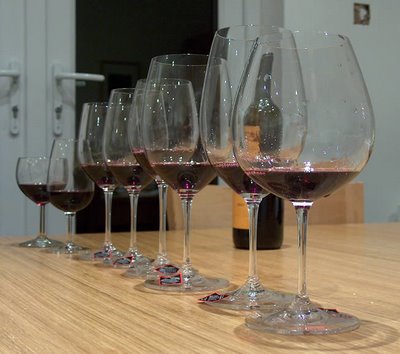A brief aside: wine glasses
 Do glasses matter? The short answer is yes, but probably not as much as some people seem to think. I’ve enjoyed great wines from tumblers in the past. Having said this, if you try the same wine in three very different sized and shaped glasses, it will taste different, although you’ll probably still recognize it as the same wine. I guess it’s like seeing someone you know in different photographs. They look a little different in each, but almost always you know who it is in the picture. It’s also true that different shaped glasses can suit different styles of wines better—Austrian glass manufacturer Riedel has built their business round this concept—but for most people who aren’t ultra-serious about their wine, one suitably shaped and reasonably generously sized glass should be good for all wine types. Avoid the squat, hemispherical glasses known as Paris goblets (the left-most glass in the picture), and instead go for something bigger and more tulip shaped.
Do glasses matter? The short answer is yes, but probably not as much as some people seem to think. I’ve enjoyed great wines from tumblers in the past. Having said this, if you try the same wine in three very different sized and shaped glasses, it will taste different, although you’ll probably still recognize it as the same wine. I guess it’s like seeing someone you know in different photographs. They look a little different in each, but almost always you know who it is in the picture. It’s also true that different shaped glasses can suit different styles of wines better—Austrian glass manufacturer Riedel has built their business round this concept—but for most people who aren’t ultra-serious about their wine, one suitably shaped and reasonably generously sized glass should be good for all wine types. Avoid the squat, hemispherical glasses known as Paris goblets (the left-most glass in the picture), and instead go for something bigger and more tulip shaped.Why do glasses affect the way a wine tastes? The main effect seems to be on the way that the aromas are released and then trapped. If you drink from a small beaker or a glass that’s pretty much full to the brim, there’s no opportunity to swirl the wine in such a way as to encourage the release of the volatile aroma molecules. And any aromas that are given off will rapidly dissipate into the air. With a larger, tulip-shaped glass, modestly filled, you can swirl the wine around, releasing aromas which are then caught—to a degree—within the headspace of the bowl. Putting it simply, the wine smells more. And if it’s a nice wine, then that is a good thing. Don’t despair, though, if all you have to hand is a tumbler or a mug: you can still taste the wine, and while it is in your mouth it will give off aromas that are then picked up by your nose through the back door route. This is known as retronasal olfaction. Thus the wine will still give you much of which it has to offer.
But there’s another aspect to wine glasses that is separate from the way that the wine is detected by our nose and taste-buds: aesthetics. Nice stemware is beautiful. If you are drinking out of a really attractive glass, this adds greatly to the wine drinking experience. This is because of expectation. If I go to my cupboard and select what I believe to be exactly the right glass for the wine I’m about to open, then this enhances the level of expectation that I bring to the wine drinking experience. And this is something not to be sniffed at; it can powerfully affect the way I perceive the wine.
Labels: glassware
